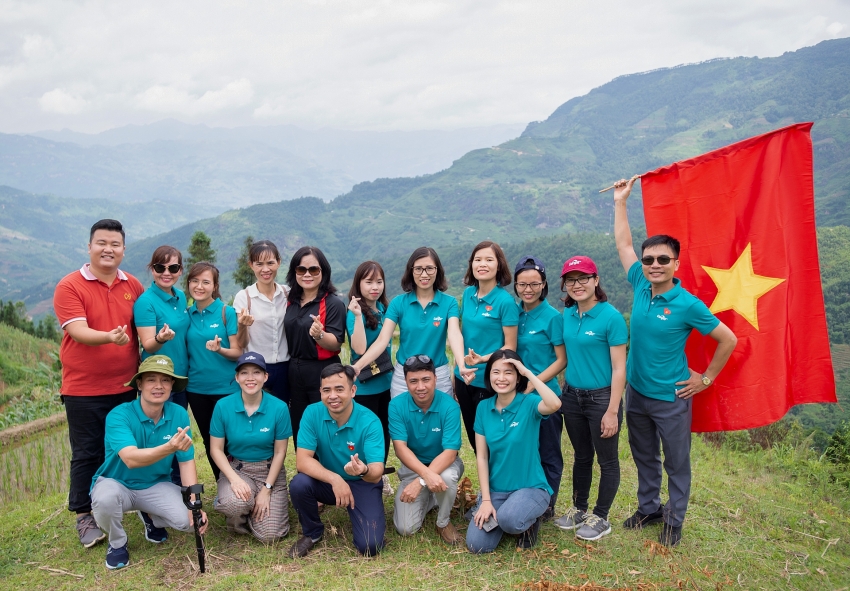Cargill works to positively impact communities where employees live and work
In the 2020 fiscal year, Cargill provided $115 million in total charitable contributions, hosted training for 860,000 farmers in sustainable agricultural practices and business practices to improve their earnings potential and provided more than 39 million meals to global and local food bank partners.
 |
| Cargill staff are performing the company's social responsibility activities at communities nationwide |
“As the world faces extraordinary challenges – from climate change to food insecurity – delivering on Cargill’s purpose to nourish the world in a safe, responsible, and sustainable way is more critical than ever before,” said Michelle Grogg, vice president of corporate responsibility at Cargill. “We collaborate with strategic partners across the globe to bring this purpose to life by empowering farmers, protecting the planet and nourishing people and communities.”
Cargill has been empowering farming communities and energising the next generation of food and agricultural leaders.
The National Future Farmers of America (FFA) Organization and Cargill continued their 60-year commitment to inspire and educate future leaders of the food and agriculture industry. Over the last year, the partnership reached 29,500 students and 500 teachers.
Cargill and CARE announced a new phase of collaboration aligned to CARE’s She Feeds the World initiative. This phase aims to improve education, nutrition, sanitation, and economic support to 2 million people across Central America, Africa, and Asia. The programme strengthens women’s skills and confidence in sustainable agriculture, financial inclusion, market engagement, gender equality, and food and nutrition – while also engaging males to support greater equality. In the first six months of the three-year programme, 502 small producers and microentrepreneurs across Guatemala, Honduras, and Nicaragua saw a gross income improvement of $540,212.
Cargill and Heifer International expanded Hatching Hope into Mexico, helping women farmers improve their livelihoods via poultry farming. The programme connects Mexican women smallholder farmers with private sector buyers, creating market access, and income opportunities. Hatching Hope has reached 206 Mexican smallholder female farmers and their families. This builds off the original Hatching Hope programme in India, which has improved earnings for 24,000 smallholder female farmers since June 2019.
In Vietnam, Cargill has built a total of 96 schools across the country, nine of those during the company’s past fiscal year. These schools positively impact and bring education opportunities to 15,000 students annually.
In addition, Cargill has also been nourishing communities. Specifically, in partnership with the Global FoodBanking Network, Cargill provided 14,640,750 meals across 16 countries.
Feeding America and Cargill supported the creation of a new USDA clean room at the Houston Food Bank that, once in place, will deliver 3 million more pounds of protein annually to families in need. Cargill’s other contributions to Feeding America helped provide more than 1 million meals across the US.
In Canada, Cargill worked with Food Banks Canada to provide 554,772 meals.
In Central America, Cargill worked with World Central Kitchen to train school cooks in 40 schools across Nicaragua, Honduras, Guatemala, and Costa Rica on how to improve the safety, sanitisation, and nutritional value of the food they prepare for more than 15,000 students. This initiative also significantly reduced food waste.
The Cargill Foundation, contributed more than $10 million to over 50 local nonprofits and schools in its headquarters state, Minnesota, to provide support for low-income children of colour. Targeted investments in childhood nutrition, STEM education and college and career readiness brought to life the company’s goal to advance racial equity.
Cargill and Save the Children partnered in Thailand to promote positive nutritional practices and physical activity among children, adolescents, and communities through school-based programmes. The programme is running across 50 schools and impacted 3,500 children. Cargill and Save the Children also launched programmes in Indonesia, Cote d’Ivoire, and the Philippines.
“Thanks to Cargill’s support of The Global FoodBanking Network, food banks in 44 countries served 1.4 billion meals to families facing hunger. Unfortunately, the number of those suffering from food insecurity are steadily on the rise,” said Lisa Moon, president and CEO of The Global FoodBanking Network. “Due to the devastating impacts of COVID-19, demand for food relief has skyrocketed in the countries we serve. Our partnership with Cargill is now more important than ever, since early March this collaboration has enabled food banks in our network to reach more than 21 million people facing hunger.”
What the stars mean:
★ Poor ★ ★ Promising ★★★ Good ★★★★ Very good ★★★★★ Exceptional
 Tag:
Tag:
Related Contents
Latest News
More News
- Masan Consumer names new deputy CEO to drive foods and beverages growth (February 23, 2026 | 20:52)
- Myriad risks ahead, but ones Vietnam can confront (February 20, 2026 | 15:02)
- Vietnam making the leap into AI and semiconductors (February 20, 2026 | 09:37)
- Funding must be activated for semiconductor success (February 20, 2026 | 09:20)
- Resilience as new benchmark for smarter infrastructure (February 19, 2026 | 20:35)
- A golden time to shine within ASEAN (February 19, 2026 | 20:22)
- Vietnam’s pivotal year for advancing sustainability (February 19, 2026 | 08:44)
- Strengthening the core role of industry and trade (February 19, 2026 | 08:35)
- Future orientations for healthcare improvements (February 19, 2026 | 08:29)
- Infrastructure orientations suitable for a new chapter (February 19, 2026 | 08:15)
























 Mobile Version
Mobile Version